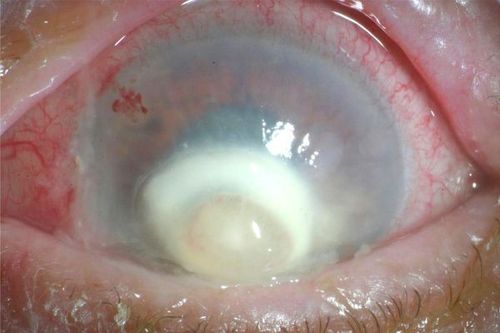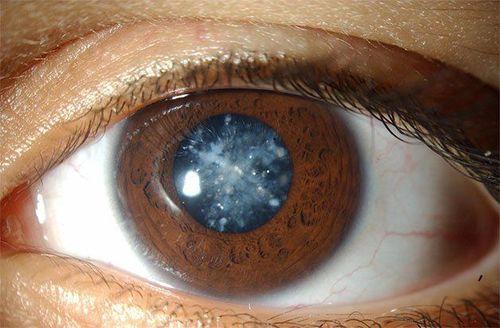This is an automatically translated article.
Sudden blurred vision makes it difficult to see clearly or do normal tasks. While not all cases are a cause for concern, some may require prompt medical attention. The article below gives you more information on some of the possible causes of sudden vision loss, when to seek medical attention, and some treatments.
1. Retinal detachment causes sudden blurred vision
Retinal detachment occurs when the cells of the retina (the thin layer at the back of the eye) separate from the blood vessels that supply the retina with essential oxygen and nutrients. Symptoms can appear quickly. Without prompt and prompt treatment, permanent eye damage and vision loss can occur. Some symptoms of retinal detachment:Sudden occurrence of fly fly, which is gray or black floating spots; Flashing light in 1 or 2 eyes; Sudden blurred vision; Gradual decrease in vision in the periphery or on one side of the field of vision. Retinal detachment can permanently damage vision if not treated quickly. Treatment will include reattaching the retina. Some treatment methods are often applied by doctors such as surgery or laser surgery, freezing of the retina.
2. Concussion causes blurred vision
Concussion occurs when a person has a head injury. External concussion causes vision changes such as sudden blurred vision, the following symptoms may also occur such as mood swings, forgetfulness, headache, dizziness, drowsiness.
When you have a head injury, go to the doctor and be assured that the injury is not serious, treatment focuses on relieving symptoms. A person with a concussion needs to rest for 24–48 hours, possibly with over-the-counter pain relievers to help relieve headache symptoms.

Mắt mờ đột ngột khó khiến bạn không thể nhìn rõ hay làm các công việc thông thường
3. Stroke causes sudden blurred vision
A stroke can cause blurred vision on one or both sides. Other possible symptoms of a stroke include:
Numbness in the face, leg or arm, usually on one side of the body; Confusion and difficulty speaking or understanding; Sudden blurred vision in one or both eyes; Difficulty walking, dizziness and lack of coordination; Sudden and severe headache. When you suspect a patient has had a stroke, you should call emergency services immediately and follow the FAST abbreviation:
F (Face) for face: Ask the patient to smile and take note see if their smile is distorted to one side; A (Arm) for the arm: Ask the patient to raise both arms and note if one arm is drooping; S (Speech) for speech: Ask to say a simple phrase to see if the patient suddenly has difficulty speaking or stutters; T (Time) for time: If any of the above occur, call emergency services immediately. Treatment will be more effective if the patient is treated early within 3 hours of the first symptom. Treatment for a stroke will depend on the type and part of the brain affected and what caused it.
4. Symptoms of sudden loss of vision due to endophthalmitis
Endophthalmitis is a serious infection of the tissue and fluid inside the eye. Besides the sudden loss of vision, other symptoms include eye pain, redness, and sensitivity to light.
A serious complication of endophthalmitis is blindness which can occur if the patient is not treated quickly.
Treatment of endophthalmitis includes antibiotic or antifungal injections, emergency surgery is performed in some severe cases.
5. Hemorrhage in the anterior chamber
A common cause of anterior hemorrhage is trauma and infection, which ruptures some blood vessels in the eye. Possible symptoms of anterior chamber hemorrhage include: blurred vision with pain, bleeding in the eye, and sensitivity to light.
To treat anterior chamber hemorrhage, the patient needs to:
Wear protective goggles as well as limit exposure to light; Elevate your head even during sleep to help drain eye secretions; Use eye drops containing atropine, which dilate the pupils; If you have anterior bleeding, your ophthalmologist may recommend surgical removal of the blood.

Đột quỵ gây mờ mắt đột ngột
6. Giant cell arteritis (GCA)
Giant cell arteritis is a systemic disease that affects almost every medium to large blood vessel in the body. In addition to sudden blurred vision, people with giant cell arteritis may experience headaches, rheumatoid arthritis, and temporal artery pain.
According to some studies, this disease usually only affects adults, especially those over 50 years old.
Corticosteroid treatment should be started as soon as possible, to help prevent permanent damage to vision.
7. Aged macular degeneration
Age-related macular degeneration is a disease that affects the retina especially in the macula - the central and most important area of the retina, causing blurred vision. This disease is one of the leading causes of permanent vision loss in the elderly, it can occur in one or both eyes.
There is currently no treatment for the early stages of age-related macular degeneration. Lifestyle changes, such as quitting smoking, help slow the progression of the disease in its early stages.
If the disease is advanced, injections into the eye are used to improve symptoms, or laser treatment to slow vision loss.
8. Macular holes cause blurred vision symptoms
Macular hole occurs when there is a small tear in the macula and is common in adults over 60 years old
People with macular hole in the early stages have symptoms of blurred vision, notice distortion in the central part and Straight lines can be wavy.
In later stages, the patient will see a dark space in the center similar to a blind spot, the disease can cause complete vision loss.
In some cases, a small tear in the macula may heal over time. However, in most cases, the doctor will prescribe vitrectomy surgery to limit bad complications from happening.
9. Optic neuritis
The optic nerve connects the eye and the brain and transmits visual information from the retina to the brain. Optic neuritis can cause vision loss and distorted images. Some accompanying symptoms such as: pain around the eyes, loss of color vision, flashes of light
Optic neuritis usually improves on its own without treatment. However, if your symptoms are severe, your doctor may prescribe steroids to speed up your recovery. Besides, a healthy, balanced diet, drinking enough water and not smoking can help in the treatment of the disease.
10. Eye infections
Some eye infections require prompt medical treatment, which depends on the severity of the eye infection symptoms.
Keratitis Symptoms of keratitis : Watery eyes, red eyes, eye irritation and pain. Treatment will depend on what's causing the inflammation: antibiotics, antivirals, or antifungals in the form of eye drops or pills.
Conjunctivitis Conjunctivitis, also known as pink eye, is a bacterial or viral infection that affects the conjunctiva of the eyeball or the conjunctiva of the eyelids. Allergies are also a cause of conjunctivitis. Blurred vision, eye discharge, and pink or red conjunctiva are possible symptoms of conjunctivitis.
Your doctor may prescribe topical or oral antibiotics for bacterial causes, and antihistamines for allergic conjunctivitis.
Uveitis Uveitis is swelling and inflammation of the middle layer of the eye - the uvea, also known as iritis. Symptoms may include blurred vision, pain and redness in the eyes, sensitivity to light, and floaters. Uveitis can affect one or both eyes, and symptoms can appear suddenly or gradually over several days.
If the cause is identified, the underlying cause needs to be treated. Steroids are commonly prescribed to treat uveitis.

Đau nửa đầu (Migraine) gây ra hiện tượng mờ mắt đột ngột
11. Migraine causes blurred vision
Migraines sometimes come on suddenly, causing blurred vision and flashing lights.
Using medications prescribed by your doctor along with lifestyle changes can help prevent and reduce the symptoms of a migraine attack.
12. Eye fatigue can lead to sudden blurred vision
Using the phone screen or focusing on something for a long time without a break can cause eye strain. This can lead to sudden blurred vision, itchy eyes, or headaches.
Regularly resting your eyes to rest will help relieve symptoms.
13. When is sudden blurred vision need to contact a doctor immediately?
Call 911 or go to the nearest emergency room if sudden blurred vision occurs and one or more of the following symptoms:
Symptoms of a stroke: Numbness or weakness in the face, leg or arm, on one side of the body body; difficulty speaking, slurred speech; difficulty walking, dizziness, or lack of coordination; severe headache; Accompanied by severe eye pain. This will help prevent damage or identify an underlying disease causing the blurred vision.
Not all causes of sudden blurring require urgent medical treatment. However, if you have sudden blurred vision that is suspected to be caused by a stroke or retinal detachment, or if you have severe eye pain, you should go to the nearest emergency room. In case of sudden unexplained blurred vision, you should also consult an ophthalmologist as soon as possible, even if this symptom has disappeared.
Please dial HOTLINE for more information or register for an appointment HERE. Download MyVinmec app to make appointments faster and to manage your bookings easily.













